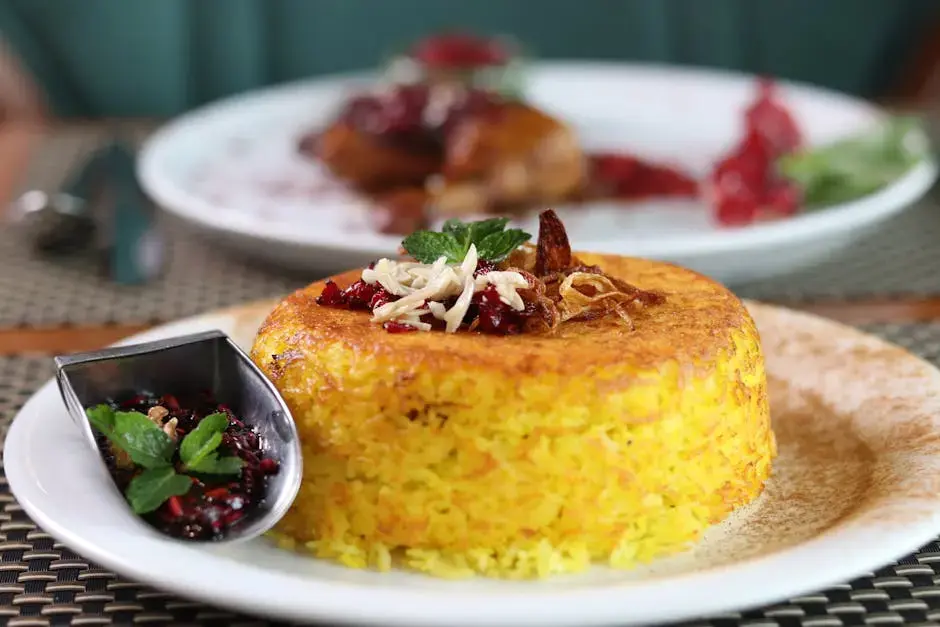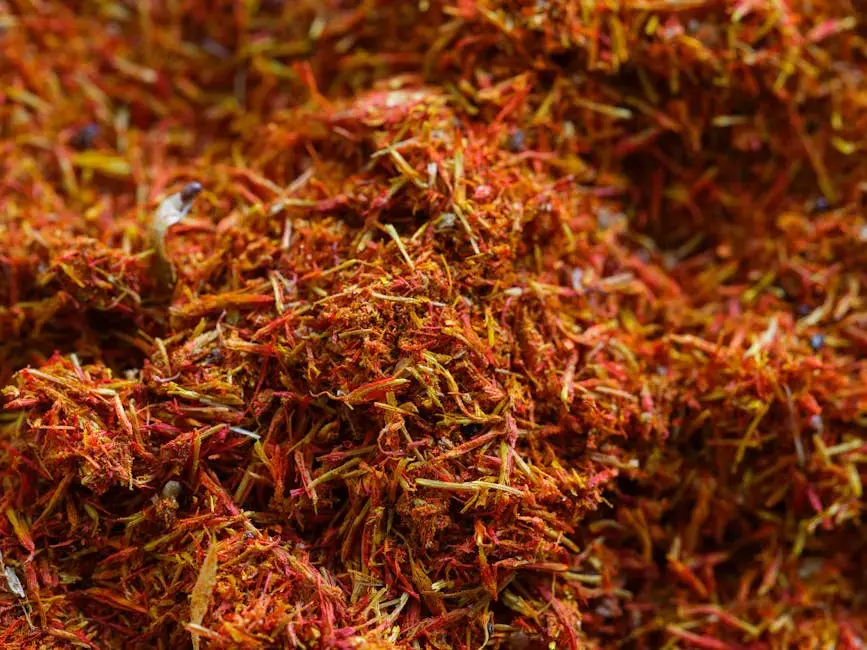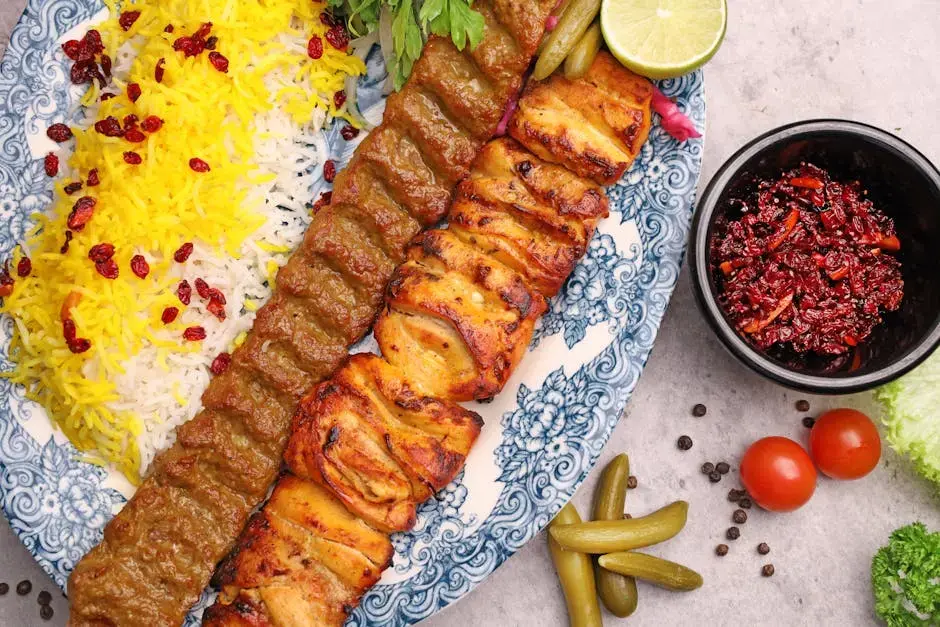Why Vegan Persian Dishes Deserve a Place on Your Plate
- Chelo
- Feb 19, 2025
- 5 min read
Persian cuisine is renowned for its rich flavors and fragrant aromas. Traditionally laden with meat, this culinary tradition has transformed in exciting ways to welcome plant-based enthusiasts. In this blog, we delve into the tantalizing world of vegan Persian dishes and why they are a delightful addition to your menu.

The Rich Heritage of Persian Cuisine
Persian cuisine boasts a long-standing tradition of using fresh herbs, spices, and unique ingredients that create complex and delicious flavors. Its rich history offers a fertile ground for creating vegan versions of classic dishes that maintain authenticity while encouraging dietary diversity. Historically, Persian dishes have always celebrated the bounty of nature, incorporating seasonal produce in innovative ways. Whether it's the aromatic herbs or the tartness of barberries, each ingredient is carefully selected to complement the others, creating a harmonious dish that's more than the sum of its parts. This culinary tradition has been passed down through generations, each adding its own twist while preserving the essence of what makes Persian flavors so enticing. Revisiting these recipes with a vegan lens not only pays homage to tradition but also invites a new generation to appreciate the culinary mastery of Persian chefs through the ages. It's a testament to how centuries-old culinary practices can adapt and thrive in modern kitchens, blending heritage with contemporary dietary choices.
While many might assume that Persian cuisine is predominantly meat-centric, the variety and depth of its plant-based components paint a different picture. One might marvel at the creative use of nuts, grains, and legumes, all of which are staples in Iranian households. Traditional Persian kitchens have long been adept at transforming these simple ingredients into mouthwatering dishes that captivate the senses. This intrinsic adaptability of Persian cuisine makes it a perfect candidate for vegan adaptations, showcasing the versatility and depth of plant-based cooking. For example, the ancient bazaars were akin to treasure troves, offering insights into how historical trades introduced new flavors that became integral to Persian recipes. By embracing veganism, modern chefs are essentially rediscovering this historical willingness to explore and innovate with novel ingredients.
Key Ingredients That Define Vegan Persian Dishes
Vegan Persian dishes rely heavily on a handful of staple ingredients such as saffron, pomegranates, and a variety of herbs and spices. These components not only enhance taste but also provide numerous health benefits, making Persian dishes a nutritious choice. Saffron, known as ‘red gold’ due to its rarity and rich color, infuses dishes with a luxurious aroma and flavor, often turning a simple meal into a feast for the senses. Similarly, pomegranates are not only valued for their vibrant taste but are also packed with antioxidants, supporting heart health and reducing inflammation. Fresh herbs like parsley, cilantro, and mint are liberally used, imparting freshness and vitality to many dishes while playing a vital role in balancing flavors. Another significant element in crafting vegan Persian dishes is the use of legumes, such as lentils and chickpeas, as they provide substantial protein, making the meals both filling and nourishing.
In the realm of spices, the likes of cumin, cinnamon, and turmeric are celebrated for their ability to elevate a dish's profile, each lending its unique warmth and earthiness. These spices are not only crucial for flavor but also carry health-promoting properties. For instance, turmeric is renowned for its anti-inflammatory benefits, while cinnamon can help regulate blood sugar—a reflection of how Persian cuisine seamlessly marries taste with wellness. Additionally, ingredients such as dried limes add a unique tangy depth, essential in many stews and rice dishes, showcasing the ingenuity in using local produce to craft flavor landscapes that tantalize the palate. This careful selection of ingredients demonstrates the dedication to crafting dishes that are wholesome and vibrant, making vegan Persian cuisine a delightful experience full of variety and surprise.
Classic Persian Dishes with a Vegan Twist
Many traditional Persian dishes like 'Ghormeh Sabzi' and 'Fesenjan' have been creatively adapted into vegan versions. These adaptations preserve the traditional taste while eliminating meat, offering a cruelty-free dining option that doesn't compromise on flavor. 'Ghormeh Sabzi,' traditionally a herb stew with meat, transforms beautifully when packed with spinach, parsley, and kidney beans instead. The absence of meat is compensated by the bold flavors of freshly chopped herbs and the tangy kick of dried limes, capturing the essence of the original dish in a plant-based form. Similarly, 'Fesenjan,' a beloved walnut and pomegranate stew, is easily veganized by focusing on its rich, nutty, and fruity base, which is so flavorful that meat becomes an afterthought. Instead, adding mushrooms or seitan provides texture, making the dish both satisfying and nourishing.
It is fascinating to see how simple adjustments can maintain the integrity of a dish while making it accessible to vegans. Take 'Kuku Sabzi,' a herb frittata brimming with fresh greens—this is a quintessential vegetarian delight that can seamlessly be made vegan by using chickpea flour instead of eggs, preserving its original character. The interplay of fresh herbs like dill and coriander with barberries creates a sweet yet tangy delight that is both refreshing and hearty. Such dishes highlight a movement within Persian cooking that embraces new dietary habits without sacrificing beloved flavors. This creative approach not only encourages more people to try Persian cuisine but also ensures it remains relevant and adaptable, reflecting a broader trend in global gastronomy towards plant-based eating. These dishes remind us that with a bit of creativity and an open mind, the possibilities in vegan cooking are as expansive and richly textured as the flavors themselves.
Another iconic Persian dish that has gained prominence in the vegan world is 'Ash Reshteh,' a hearty noodle soup traditionally prepared with a variety of beans and herbs. To adapt this dish for a vegan diet, chefs simply forego the customary meat and use vegetable broth to enhance the rich flavors instead. In fact, veganized Persian cuisine can surprise even the most ardent meat-lovers with their depth of flavor and hearty textures. Additionally, the addition of caramelized onions and sautéed garlic enhances the umami profile, proving that meatless versions of such dishes can be equally satisfying. This approach captures the timeless comfort offered by traditional recipes, emphasizing that hearty, comforting meals can be equally enjoyed without animal ingredients, paving the way for innovative culinary experiences.
Health Benefits of Vegan Persian Cuisine
Opting for vegan Persian dishes offers a host of health benefits, including improved digestion, increased energy, and a reduced risk of chronic diseases. The emphasis on vegetables, legumes, and whole grains aligns with a balanced diet, promoting overall well-being. These plant-based meals are naturally rich in fiber, which aids in digestion and helps maintain a healthy gut microbiome. Furthermore, the exclusion of saturated fats found in meat decreases cholesterol levels, supporting heart health over the long term. With ingredients like beans and nuts providing ample protein, replacing meat with plant-based options doesn't mean sacrificing nutritional value. Instead, it introduces a range of micronutrients that might otherwise be missing, ensuring a diet that is both complete and nourishing.
Studies have shown that plant-based eating can lead to stable blood sugar levels, aiding in the management of Type 2 diabetes, which is becoming increasingly relevant as dietary habits shift globally. Persian dishes, with their symbiosis of spices, herbs, and whole foods, are perfect examples of how culinary traditions can be married with modern health trends to foster sustainable living. The inherent nature of these dishes encourages mindful eating, as the careful blending of flavors calls for a slower, more appreciative dining experience that is both pleasurable and satisfying. Embracing vegan Persian cuisine channels this harmonious balance between indulgence and wellness, nurturing both the body and soul with every bite. As more people search for flavorful, health-forward meal options, Persia's rich culinary tapestry continues to offer something truly extraordinary: delectable taste experiences that don't compromise health for flavor, but rather, enhance it.
A Vibrant Plant-Based Culinary Adventure
Incorporating vegan Persian dishes into your culinary repertoire opens up a world of flavors that are both exciting and nourishing. These dishes are a testament to how traditional flavors can be reinvented to accommodate modern dietary preferences without losing their essence. Embrace the vibrant, plant-based side of Persian cuisine and let your taste buds embark on a memorable journey.




Comments